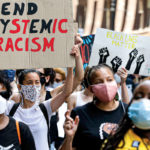“Well, you seem like someone who would burn the American flag,” an old friend furiously texted me as we debated last summer’s protests against police brutality.
“I wouldn’t burn the flag, but I am disappointed and furious with how this country treats Black people and have every right to be.” I replied as my blood began to boil.
Throughout this conversation I learned many truths about someone who I once considered a close friend. I discovered she was racist and confuses a love for one’s country with hateful ignorance. And while I was only talking with one person in that instance, it provided insight into every other similar conversation or confrontation I have had in my life.
For some reason, the minute a Black person, or any other marginalized human being, dares to speak truthfully about their experience as a human being within the United States, they are also declaring their hatred for this country. And although there are many people who have every right to hate a country that has mutilated their bodies, stolen their livelihoods, or treated them as less than in every imaginable circumstance, not all people who criticize this country hate it. In fact, criticism is offered when one believes another not only should do better but is capable of doing so. So, actually, critiquing the United States is a sign of love, or, at the very least, hope.
Regardless, though, let’s discuss what someone is actually saying when responding with, “Well, you must hate your country.” Often, the person they say this too is rejecting unethical and unjust treatment (like racism) or laws. If your first response to this rejection is that they hate their country and are Unamerican, then you are stating that accepting these ideologies and actions are an integral part of being American.
This belief is harmful. It encourages those who are “patriotic,” to defend systems, ideologies, and actions that are founded in ignorance and hatred. America wants to define itself as a home for all, but it does not act that way.
On the other hand, if your, or anyone else’s response, to someone’s truths around racism, ableism, transphobia, and more, is to shame them, then how dare you? This response entirely invalidates and erases the experiences and trauma of others. Your responsibility is to listen and listen, quietly. In fact, do not speak at all if you are choosing violence.
If you or someone you know truly wants to love our country, we all must step up and criticize it. Criticizing allows us to hold people accountable and work towards calling people in. I am not proud of our country’s past or present, but I would like to be proud of its future.


